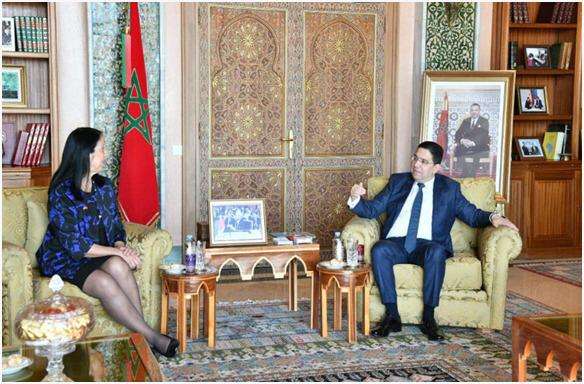United States-Morocco: Michele Sison reiterates US support to Moroccan autonomy plan as a serious, credible and realistic solution to the Sahara dispute
The meeting also focused on the continued support of the United States to Staffan de Mistura in his role as the UN Secretary General's personal envoy for the Sahara, she said.
The US Assistant Secretary of State for International Organizations, Michele Sison, reiterated, on Wednesday 25 January in Rabat, the US support to the Moroccan autonomy plan as a serious, credible and realistic solution to the Sahara dispute.
“The United States continues to consider the autonomy plan presented by Morocco as serious, credible and realistic,” said Sison during a press briefing after her talks with the Minister of Foreign Affairs, African Cooperation and Moroccans Living Abroad, Nasser Bourita.
As a reminder, in December 2020, Washington had proclaimed that the autonomy proposal in the Sahara is “serious, credible and realistic”, calling it “the only basis for a just and lasting solution”, to the dispute over the Moroccan Sahara.
The US presidential proclamation recognizing Morocco’s full sovereignty over its Sahara was, in the meantime, distributed to the 193 UN member states, as an official document of the Security Council, in the six official languages of the UN.
The meeting also focused on the continued support of the United States to Staffan de Mistura in his role as the UN Secretary General’s personal envoy for the Sahara, she said.
In addition, Michele Sison welcomed the positive and productive discussions she had with Minister Nasser Bourita, regarding the commitment of Morocco and the United States to the maintenance of peace and security.
In this context, Ms. Sison said that the US “greatly appreciates the role of His Majesty King Mohammed VI in supporting peace and security in the Middle East and North Africa, and around the world.
The American diplomat thus emphasized how much the Biden Administration appreciates the Kingdom’s contributions to UN peacekeeping missions throughout the world. Moreover, no less than 21 UN agencies are based in Morocco, which in itself indicates the essential role of the Kingdom as a regional leader and its commitment to multilateral diplomacy.
In recalling the leadership of His Majesty the King in the promotion of peace and security in North Africa and the Middle East, as well as the essential role played by the Kingdom in UN peacekeeping missions around the world, the American position as reiterated by the US official is part of a historical partnership (the two countries have maintained relations since the proclamation of the independence of the United States of America in 1776) which has been constantly consolidated in various fields.
This position, which is characterized by sincerity and mutual respect, contrasts with the fluctuating nature of the relationship with France, which has difficulty in shedding the tutelary aspects of a bygone colonial era.
The age-old relationship between the United States and Morocco is not limited to invoking the past, but goes far beyond it, taking advantage of the historical construct to open up renewed and mutually fruitful perspectives, unlike those who exploit history to maintain a hegemony and a geostrategic rent that no longer have any place.
In the wake of this, the European and particularly French backlash is giving way to the strengthening and diversification of partnerships with traditional allies, notably the United States. France is unhappy with its downgrading inherent in the new dynamics of the Moroccan-American partnership, in the wake of the Abraham agreements.
The constancy of American friendship towards the Kingdom is thus consolidated by the recognition by the United States of Morocco’s leadership as a pole of peace and stability in the world.
The introduction of Director General of the International Organization for Migration, Ms. Amy Pope, who is part of the delegation, and through her the Biden Administration, is a recognition of the central role of His Majesty the King, designed by His African peers as the leader of the African Union on migration issues. It is also a recognition of the humanist approach at the heart of the national immigration and asylum strategy initiated by the Sovereign.
Michele Sison’s visit to the Kingdom is part of an age-old friendship that has never wavered and reminds us that the two countries have always been on the same side of history, whether it be during the Second World War, the Cold War, the fight against the scourge of terrorism or the promotion of peace and security in the Middle East.


